Goalkeepers are, by their job description, different; the outsiders in football. They choose to play ‘Foot-ball’ using their hands, an act which is considered a disgrace by the rest of their teammates (unless you are an Argentinian God).
They put their bodies in places where others put their studs. Yet, at the end of the day, they are remembered for their mistakes. “Under Brazilian law, the maximum sentence is 30 years. But my imprisonment has been for 50.” - this statement was reportedly made by the Brazilian goalkeeper Moacir Barbosa Nascimento few days prior to his death.
In spite of winning many awards and trophies (notably, he was voted by the journalists as the best keeper of the 1950 World Cup), he is infamous for ‘Maracanazo’. Barbosa was largely held as the culprit for Brazil’s shocking defeat against Uruguay in 1950 World Cup finale.
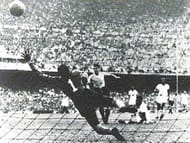
He was not allowed to enter Brazil’s training camp as he was considered to be a bad omen. This is one of the many infamous stories of goalkeeper becoming the scapegoat.
The goals are remembered, the saves are not. Perhaps this is the reason behind the disaffection and apathy towards the goalkeepers from the football community and the media. Gary Speed once said, "Everybody makes mistakes, but when goalkeepers make them, it is costly. That's the nature of being a goalkeeper."
“Igor Akinfeev’s Butterfingers” from the 2014 World Cup is one of the recent, hugely criticised, goalkeeping mistakes. But perhaps, the most notorious of all is Robert Green’s howler in 2010 World Cup’s group stage against the USA.
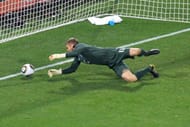
Green failed to stop a loose, grounded, long-range shot from Clint Dempsey. It ended up being a goal despite his subsequent attempt to keep the ball out of goal. The match finished in a 1-1 draw.
Although England eventually qualified for the Round of 16 after winning against Slovenia in the last match of the group stage, Green was dropped from the squad permanently only to appear once more for his country.
Ironically, nobody remembers the crucial save he made earlier that day which kept England in the game. Even, Real Madrid's great, Iker Casillas, was not spared and ridiculed after conceding from Diego Godin's unchallenging header in UEFA Champions League Final, in 2014.
Goalkeepers are often called crazy or weirdos. Who would not remember Oliver Kahn receiving a second yellow card - in the last matchday of 00/01 Bundesliga season - in a fascinating manner? He was booked for trying to score a goal by punching with his fists inside the opponent's penalty area.
From constant howling at their defenders - for allowing the opponent to take shots on goal, to standing in solitary for most of the match, attentively waiting for the ball. It all comes with the job. Perhaps, a little amount of crazy helps them remain sane.
The record of scoring the longest goal is held by former Stoke City goalkeeper Asmir Begovic. It was scored from 91.9 meters, from inside his own penalty box, as the ball bounced over Southampton keeper Artur Boruc, who came rushing out of his goal. Begovic shook his head in embarrassment and surprise, as he almost felt sorry for his opposite number.
Perhaps, it is true that only a goalkeeper can understand the misery of a fellow keeper. Begovic knew excatly what was going through the mind of the goalkeeper on the other side, and the stick he was sure to receive.
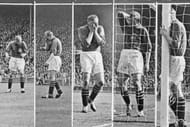
There have been some saves though, that football fans fondly recall. But these instances are few and far between.
Gordon Bank's miraculous save from the 1970 World Cup, which denied Pele's header, is considered to be the greatest save in the history of football. Peter Schmeichel's spectacular save against Tottenham Hotspurs in 1994 is also right up there.
But most keepers are celebrated for something other than the saves they made. Manchester United goalkeeper Harry Gregg pulled out his teammates and several other people from the burning plane including the famous Bobby Charlton. Although he kept 48 clean sheets throughout his Manchester United career, he is commonly known as “The Hero of Munich” for his exemplary bravery.
In 1956 FA Cup final, Manchester City goalkeeper Bert Trautmann broke several vertebrae in his neck after colliding with Peter Murphy, but continued to play the match, unaware of the seriousness of the injury.
While some goalkeepers are remembered for their bravery, others are recognised for their uniqueness. For instance, despite providing several match-winning performances, the 5'6" Jorge Campos who was popular for his peculiarly short height for a goalkeeper and colourful playing attires.
Colombian sweeper-keeper, Rene Higuata left the spectators awestruck with his scorpion kick save. He was also quirky in his playing style. He used to dribble outside the box with ease like a midfield maestro.
French keeper Fabian Barthez was the first choice goalkeeper and won the World Cup in 1998. Funnily though, he is known for his bald head, and teammate Laurent Blanc kissing his head before the matches for good luck.
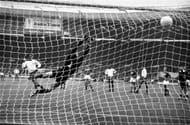
The first time a goalkeeper won the Ballon d’Or was in 1963, as the legendary Russian goalkeeper Lev Yashin received the award. Yashin is considered by many to be the greatest goalkeeper in the history of football.
He played in an unconventional manner coming off the goal line, blocking shots and commanding the penalty area, all of which was unprecedented at that time. This remains the last instance of a goalkeeper winning Ballon d’Or till date. This indicates how unacknowledged and unglamorous the position is.
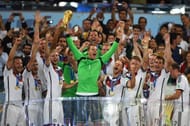
In recent times, many heroic goalkeeping performances have received admiration from all over the football community, but is seemingly insufficient in the Ballon d’Or race.
One of the most renowned German goalkeepers, Oliver Kahn, put in an extraordinary performance in the 2002 World Cup - when his team conceded only 3 goals throughout the entire Tournament. Germany lost the finale 0-2 against Brazil. Kahn was awarded the Golden Gloves along with the Golden Ball, but only finished third in the Ballon d’Or race as Brazil’s Ronaldo won the award for a second time.
The most prominent example of goalkeeping performances not being acknowledged is the 2014 Ballon d’Or. After his phenomenal World Cup winning spell, Germany’s sweeper-keeper Manuel Neuer was largely speculated as being the winner.
Despite Cristiano Ronaldo’s arguably forgettable World Cup performance, he claimed the award with 37.66% votes. Neuer came a distant third with only 15.72% votes. It seems as though his is the closest a goalkeeper is ever going to be to the Ballon d’Or, at least for the next decade.
So, goalkeepers are often asked why they chose to become one. For most, goalkeeping came as an accident rather than as a choice. FC Barcelona’s famous Victor Valdes who recently retired from professional football was among them. He described playing goalkeeper as a kid, as “constant suffering”. He retired as one of the most decorated goalkeepers of all time.
Others, like England’s David James, always wanted to become a goalkeeper. When asked the same question, the most loved goalkeeper in football, Gigi Buffon jokingly said; “You score goals as a kid, then you grow up stupid and become a goalkeeper.”
A goalkeeper cannot win you a game; he can only save it. Perhaps, this thrill of saving games inspires generations of young footballers to become goalkeepers.
